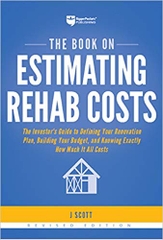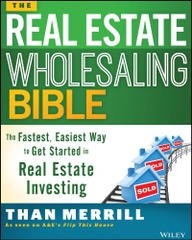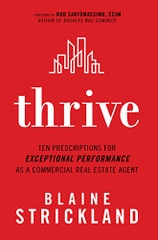-
-
-
Tổng tiền thanh toán:
-
-
Thông tin
-
Tìm sách theo yêu cầu
Book Description
Publication Date: December 1, 2006 | ISBN-10: 0324305486 | ISBN-13: 978-0324305487 | Edition: 2
Learn to analyze commercial real estate from an investment perspective with COMMERICAL REAL ESTATE ANALYSIS AND INVESTMENTS and its accompanying CD-ROM! Presenting the essential concepts, principles, and tools for the analysis of commercial real estate, this real estate text provides you with the tools you need to understand real estate investments in today's dynamic economy. Studying is made easy with the CD-ROM that provides expanded coverage as well as spreadsheet examples of methodologies, data used in exhibits, lecture slide notes, and answers to study questions.
- Link: http://www.amazon.com/Commercial-Real-Estate-Analysis-Investments/dp/0324305486
Product Details
- Hardcover: 880 pages
- Publisher: ONCOURSE LEARNING; 2 edition (December 1, 2006)
- Language: English
- ISBN-10: 0324305486
- ISBN-13: 978-0324305487
- Product Dimensions: 10.3 x 8.6 x 1.4 inches
- Shipping Weight: 3.6 pounds (View shipping rates and policies)
- Average Customer Review: 4.7 out of 5 stars See all reviews (9 customer reviews)
- Amazon Best Sellers Rank: #53,772 in Books (See Top 100 in Books)
- #10 in Books > Business & Money > Real Estate > Mortgages
- #14 in Books > Textbooks > Business & Finance > Real Estate
- #68 in Books > Business & Money > Real Estate > Investments
Most Helpful Customer Reviews
48 of 50 people found the following review helpful
5.0 out of 5 stars Great book, but you need to compliment it with others... April 25, 2010
By Michael Rand
Format:Hardcover|Verified Purchase
Overall, my favorite real estate book and the one I consult most often.
At the risk of oversimplification, commercial real estate valuation can be broken apart into 3 activities:
1) Figuring out how much cash a property will generate (e.g. pro-forma property financials)
2) Figuring out how to discount that cash for time and risk (e.g. discount/cap rates)
3) Figuring out how to slice this asset value into various claims against it (e.g. mortgages/CMBS, preferred equity structures, etc.)
This book is amazing at #2 and only slightly less amazing at #3. In fact, I find its treatment of some materials (e.g. risk-neutral discounting as it relates to development properties) to be an excellent complement to and in some ways more informative than standard finance textbooks (e.g. Brealey / Myers). The authors do admit that their approach is slightly more academic than rules-of-thumb used in practice, but it never hurts to be more informed than your peers. If you're concerned about being too academic, also pick up the text by Peter Linneman Real Estate Finance & Investments: Risks and Opportunites; (2nd Edition), which covers similar material in a less academic, though still logically sound manner.
I found, and many of you may find, the treatment of #1 (cash flow forecasting) somewhat limited. The book does deal in Part II with urban economics and in Part IV with property-level pro-formas, but these topics fly well above the depth available in other texts.
I recommend that you compliment this text with something on market analysis...I own Real Estate Market Analysis: A Case Study Approach. A text like that gets you up the learning curve on key supply-and-demand metrics for each collateral type. There are also books on real estate operations (e.g. property management and loan servicing) that could compliment the Geltner text if you're into that level of detail.
Side note: make sure to print out the appendices. They are a very useful supplement to the text.
At the risk of oversimplification, commercial real estate valuation can be broken apart into 3 activities:
1) Figuring out how much cash a property will generate (e.g. pro-forma property financials)
2) Figuring out how to discount that cash for time and risk (e.g. discount/cap rates)
3) Figuring out how to slice this asset value into various claims against it (e.g. mortgages/CMBS, preferred equity structures, etc.)
This book is amazing at #2 and only slightly less amazing at #3. In fact, I find its treatment of some materials (e.g. risk-neutral discounting as it relates to development properties) to be an excellent complement to and in some ways more informative than standard finance textbooks (e.g. Brealey / Myers). The authors do admit that their approach is slightly more academic than rules-of-thumb used in practice, but it never hurts to be more informed than your peers. If you're concerned about being too academic, also pick up the text by Peter Linneman Real Estate Finance & Investments: Risks and Opportunites; (2nd Edition), which covers similar material in a less academic, though still logically sound manner.
I found, and many of you may find, the treatment of #1 (cash flow forecasting) somewhat limited. The book does deal in Part II with urban economics and in Part IV with property-level pro-formas, but these topics fly well above the depth available in other texts.
I recommend that you compliment this text with something on market analysis...I own Real Estate Market Analysis: A Case Study Approach. A text like that gets you up the learning curve on key supply-and-demand metrics for each collateral type. There are also books on real estate operations (e.g. property management and loan servicing) that could compliment the Geltner text if you're into that level of detail.
Side note: make sure to print out the appendices. They are a very useful supplement to the text.
XEM CHI TIẾT TẠI AMAZON.COM
- Thông tin chi tiết
- Mục lục
- Đánh giá & bình luận của người mua
- Những cuốn sách cùng chủ đề hoặc có liên quan
Tại web chỉ có một phần nhỏ các đầu sách đang có nên nếu cần tìm sách gì các bạn có thể liên hệ trực tiếp với Thư viện qua Mail, Zalo, Fanpage nhé
Đăng ký nhận tin qua email
Hãy đăng ký ngay hôm nay để nhận được những tin tức cập nhật mới nhất về sản phẩm và các chương trình giảm giá, khuyến mại của chúng tôi.












